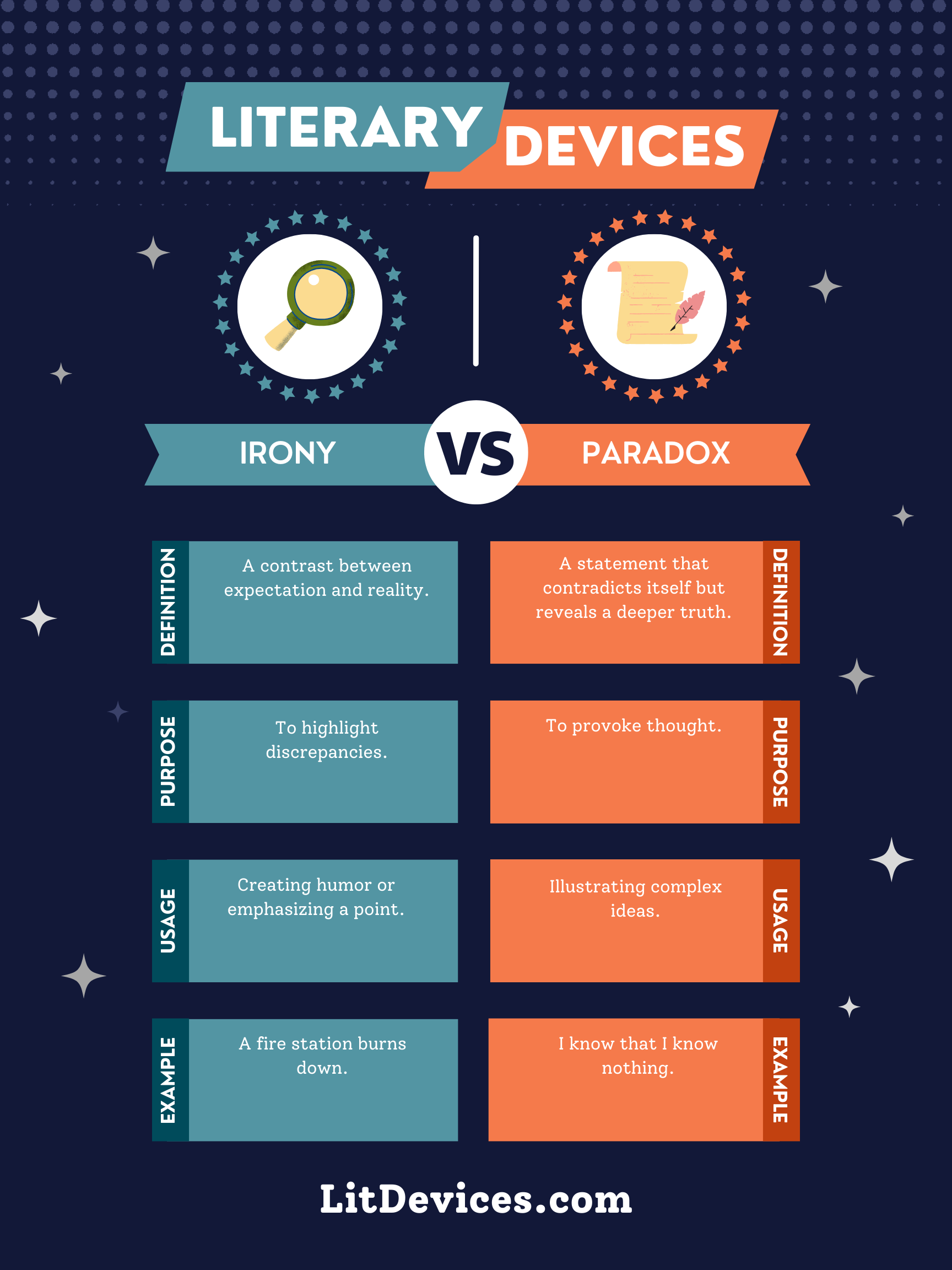Irony involves expectations being subverted; Paradox is a statement that contradicts itself but points to a truth.
Irony 🎭
Irony occurs when there’s a significant difference between expectations and reality, often in a humorous or poignant manner. It comes in various forms, including situational irony, where outcomes are opposite to what was expected; verbal irony, where words convey a meaning opposite to their literal meaning; and dramatic irony, where the audience knows something the characters do not. For example, in O. Henry’s “The Gift of the Magi,” the irony lies in both characters selling their most prized possessions to buy a gift for the other, only to find the gifts are now useless to them.
Paradox 🌀
A Paradox is a statement or concept that, despite sound reasoning from acceptable premises, leads to a conclusion that seems logically unacceptable or self-contradictory. Yet, paradoxes often reveal a deeper truth through their contradictions. For instance, Oscar Wilde’s famous paradox, “I can resist everything except temptation,” playfully highlights the human nature of wanting what we shouldn’t have.
Summary
| Literary Device | Definition | Purpose | Usage | Relevant Examples |
|---|---|---|---|---|
| Irony | A difference between expectations and reality, often used for humorous or emphatic effect. | To add humor, critique society, or create suspense. | Found in all forms of literature and storytelling. | “The Gift of the Magi” by O. Henry. |
| Paradox | A statement that contradicts itself but reveals a truth. | To provoke thought and illustrate complex truths in a concise manner. | Common in poetry, philosophy, and speeches. | “I can resist everything except temptation” by Oscar Wilde. |
Writing Tips
To enrich your writing with irony or paradox, consider these strategies:
- For Irony: Identify the expectations your readers might have and think of ways to subvert them in a meaningful or humorous way. Use irony to add depth to your characters’ decisions or the plot’s outcome.
- For Paradox: Use paradoxes to encapsulate complex ideas in a memorable, thought-provoking manner. They’re particularly effective in titles, opening lines, or to highlight the themes of your work.
FAQs
Q: Can irony and paradox appear together in literature?
A: Yes, it’s possible for an ironic situation to contain a paradoxical statement, combining both devices for a more profound effect.
Q: Is paradox always intentional in literature?
A: Yes, writers use paradoxes intentionally to challenge readers’ thinking and convey complex ideas in an engaging way.
Q: How do I know if something is ironic or paradoxical?
A: If it involves a surprising contrast between expectations and reality, it’s likely irony. If it’s a self-contradictory statement that reveals a deeper truth, it’s a paradox.
Exercise
Read the following sentence and decide if it represents irony, paradox, or both:
“The silent speaker was louder than the shout.”
Answers:
- This sentence is a Paradox because it presents a contradiction (a silent person being louder than shouting) that suggests a deeper truth about the power of silence over noise.
Other Device Comparisons You May Find Interesting
- Metaphor vs. Simile: Exploring the difference between direct comparisons and comparisons using “like” or “as.”
- Foreshadowing vs. Flashback: Examining the contrast between hints at future events and a return to past events.
- Alliteration vs. Assonance: Comparing the repetition of consonant sounds at the beginning of words with the repetition of vowel sounds within words.
- Personification vs. Anthropomorphism: Differentiating between giving human qualities to non-human entities and portraying animals or objects as having human form and characteristics.
Understanding the nuances of Irony and Paradox opens up new dimensions in literary analysis and creative writing, allowing for deeper engagement with texts and more nuanced storytelling.

